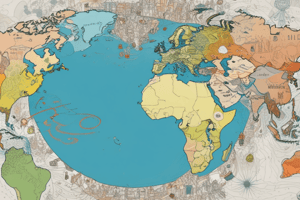Podcast
Questions and Answers
What is global governance?
What is global governance?
Global governance refers to the coordination of international actions among various actors, including governments, international organizations, NGOs, and MNEs.
Give an example of global conflicts mentioned in the text.
Give an example of global conflicts mentioned in the text.
The Russian invasion of Ukraine, Brexit, and the U.S.-China trade war.
How does globalization impact income disparities?
How does globalization impact income disparities?
Globalization tends to exacerbate income disparities and social inequality.
Name an international agreement mentioned in the text.
Name an international agreement mentioned in the text.
What are some effects of globalization on democracy and human rights?
What are some effects of globalization on democracy and human rights?
Discuss the concept of national sovereignty and self-determination in relation to political globalization.
Discuss the concept of national sovereignty and self-determination in relation to political globalization.
What are the main spheres in which nations have become interconnected in political globalization?
What are the main spheres in which nations have become interconnected in political globalization?
Which historical event accelerated globalization post-World War II?
Which historical event accelerated globalization post-World War II?
Name three prominent global organizations that facilitate cooperation among nations.
Name three prominent global organizations that facilitate cooperation among nations.
What are some examples of regional groupings promoting political and economic integration?
What are some examples of regional groupings promoting political and economic integration?
How has political globalization evolved over thousands of years?
How has political globalization evolved over thousands of years?
What are some key agreements that played a role in accelerating globalization after World War II?
What are some key agreements that played a role in accelerating globalization after World War II?
Flashcards are hidden until you start studying
Study Notes
Political Globalization: Understanding the Integration of Nations
Globalization has long been a multifaceted process involving economic, political, social, and cultural interactions among peoples and nations. This article, focusing on political globalization, will examine how nations have become increasingly interconnected and interdependent in the spheres of governance, diplomacy, and international cooperation.
Historical Perspective
Globalization did not emerge suddenly but has evolved over thousands of years, with early humans migrating and trading, and ancient civilizations linking and exchanging goods and ideas. Post-World War II, globalization accelerated with the rise of international organizations and agreements, such as the General Agreement on Tariffs and Trade (GATT) and the Bretton Woods institutions.
The Changing Landscape of Political Globalization
-
International Organizations: The United Nations (UN), World Trade Organization (WTO), and North Atlantic Treaty Organization (NATO) are some of the most prominent global organizations, facilitating cooperation and diplomacy among nations.
-
Regional Integration: The European Union (EU), African Union (AU), Association of Southeast Asian Nations (ASEAN), and others are regional groupings that seek to promote political and economic integration among their member countries.
-
Global Governance: Global governance refers to the coordination of international actions among various actors, including governments, international organizations, non-governmental organizations (NGOs), and multinational enterprises (MNEs).
-
Global Diplomacy: As nations interact more frequently, they engage in a variety of diplomatic activities, such as bilateral and multilateral negotiations, which aim to resolve conflicts and achieve common goals.
-
International Law: The development and enforcement of international law aim to protect human rights, maintain peace, and promote global cooperation and justice.
Challenges and Opportunities
-
Conflicts and Tensions: Political globalization has not been without its challenges, as nations grapple with tensions over trade, security, and human rights. The Russian invasion of Ukraine, Brexit, and the U.S.-China trade war are recent examples of global conflicts.
-
Economic and Social Inclusion: Globalization tends to exacerbate income disparities and social inequality, but it also provides opportunities for development and poverty reduction for millions of people.
-
Agreements and Accords: International agreements, such as the Paris Agreement, the World Health Organization's International Health Regulations, and the Universal Declaration of Human Rights, aim to address global challenges and promote sustainable development.
-
Democracy and Human Rights: Globalization has both positive and negative effects on democracy and human rights. While it has led to the spread of liberal democracy, it has also been associated with human rights violations and authoritarianism in some countries.
-
Sovereignty and Self-Determination: Political globalization raises important questions about national sovereignty and self-determination. Some argue that political globalization undermines national sovereignty, while others maintain that it provides opportunities for nations to collaborate and address global challenges.
Conclusion
Political globalization has transformed the landscape of international relations, bringing nations closer together and creating opportunities for cooperation and collaboration. However, political globalization also presents challenges, such as conflicts, tensions, and inequalities. As the world becomes more interconnected and interdependent, nations must navigate these challenges while harnessing the opportunities of political globalization to build a more just, prosperous, and peaceful world.
Studying That Suits You
Use AI to generate personalized quizzes and flashcards to suit your learning preferences.




